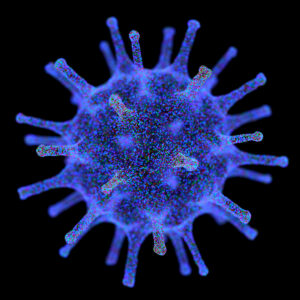February 08, 2023 | Black & Kletz Allergy
 Nearly all children get infected with respiratory syncytial virus (RSV), a highly contagious virus, by their second birthday. RSV has a seasonal predilection, usually from December to March every year. In most instances, it causes mild “cold-like” symptoms and resolves without complications in approximately 1-2 weeks.
Nearly all children get infected with respiratory syncytial virus (RSV), a highly contagious virus, by their second birthday. RSV has a seasonal predilection, usually from December to March every year. In most instances, it causes mild “cold-like” symptoms and resolves without complications in approximately 1-2 weeks.
Although most cases get better and resolve on their own, respiratory syncytial virus can sometimes lead to severe illness requiring visits to the emergency room. In some cases, hospitalization may be required. The incidence of severe illness due to RSV is especially high during the Winters in the U.S. Surging RSV infections in conjunction with the rise in flu and COVID-19 infections has been termed the “tripledemic.”
RSV is especially severe in very young children and adults over 65 years of age. Predisposing factors to severe RSV infections may also include underlying chronic lung and/or heart conditions as well as having a compromised immune system.
Respiratory syncytial virus is the most common cause of bronchiolitis (i.e., inflammation of the small airways in the lungs) in children younger than 1 year of age. RSV causes approximately 60,000 hospitalizations among children under the age of 5 annually. RSV infection is estimated to cause approximately 15,000 annual deaths in the U.S. in adults over the age of 65. Respiratory syncytial virus is the leading cause of lower respiratory tract infection in children and is a common cause of wheezing in infants and young children. Studies suggest that a severe RSV infection early in childhood is linked to development of asthma later in life.
The infection of respiratory syncytial virus spreads from person to person primarily by contact with respiratory secretions and to a lesser extent by aerosol and droplets. RSV can survive for many hours on hard surfaces such as tables and door handles and lives on soft surfaces such as tissues and hands for shorter amounts of time.
Symptoms:
The symptoms of respiratory syncytial virus usually begin 2 to 3 days after contact with the virus. The initial symptoms usually include nasal congestion and runny nose with clear mucus secretions, an itchy throat and a dry cough. Children can also experience mild fevers, poor appetite, and reduced physical activity.
For babies, thick mucus can clog up the nose and small air passages in the lungs, making it difficult for them to breathe. Narrowed bronchial tubes may also cause wheezing in addition to a severe cough. Respiratory distress requires hospitalization where supplemental oxygen and inhaled medications can be administered.
Older adults, especially those with asthma, chronic obstructive pulmonary disease (COPD), heart diseases, and/or diabetes mellitus can develop pneumonia from an RSV infection. The virus can also aggravate their underlying lung conditions requiring emergency treatment.
Diagnosis:
The diagnosis of RSV is suspected by clinical presentation and can be confirmed by laboratory tests using a nasal mucus swab. Imaging of the lungs may also be needed in order to evaluate the severity of the condition.
Treatment:
The treatment of respiratory syncytial virus is only supportive care in most instances as there is no specific medication available. For young children, nasal saline with gentle suctioning and a cool-mist humidifier may help with their breathing.
In severe cases, intravenous (IV) fluids may need to be given in order to treat dehydration. Oxygen supplementation may be needed to relieve any breathing difficulty.
A medication known as Synagis (palivizumab) is sometimes prescribed in order to minimize or prevent serious RSV disease among high-risk infants and children less than 2 years of age. This drug does not improve symptoms for children already suffering from RSV, nor does it prevent infection with RSV.
Prevention:
People infected with RSV are usually contagious for 3 to 8 days and may become contagious 1 to 2 days before they begin showing signs of the illness.
One of the most effective ways to prevent an RSV infection is to practice good hand hygiene. Frequent hand washing, covering sneezes and coughs, and avoiding direct contact with unclean surfaces are very helpful in minimizing the spread of respiratory syncytial virus.
Effective vaccines and therapeutics to prevent and treat RSV infections are in active development. The research into developing an RSV vaccine began in the 1960’s and this year (2023) RSV vaccines should be on the market. The pharmaceutical companies Pfizer, GSK, and Moderna have been working on such a vaccine and are all close to the final product. Pfizer and GSK announced promising Phase III results in 2022 and they are now both awaiting regulatory approval for the vaccine.
The board certified allergists at Black & Kletz Allergy see both adult and pediatric patients and have over 5 decades of experience in the field of allergy, asthma, and immunology. Black & Kletz Allergy has 3 convenient locations with on-site parking located in Washington, DC, McLean, VA (Tysons Corner, VA), and Manassas, VA. The Washington, DC and McLean, VA offices are Metro accessible and we offer a free shuttle that runs between the McLean, VA office and the Spring Hill metro station on the silver line. To schedule an appointment, please call any of our offices or you may click Request an Appointment and we will respond within 24 hours by the next business day. We have been servicing the greater Washington, DC metropolitan area for over 50 years and we look forward to providing you with the highest state-of-the-art allergy care in a friendly and relaxed environment.












